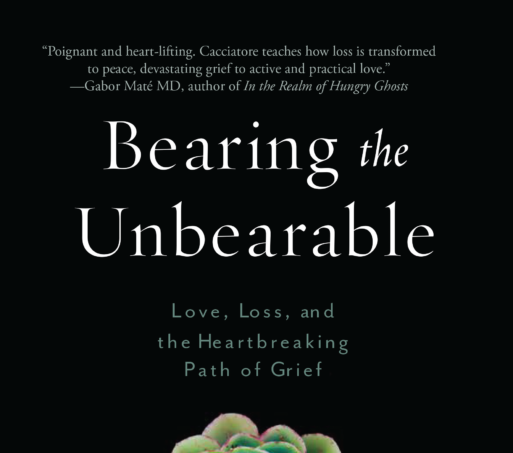 Joanne Cacciatore, Ph.D. is a researcher, educator, grief counselor and Zen priest who for over 20 years has helped her clients navigate the treacherous, terrifying path of traumatic grief. She is also a bereaved mother whose baby daughter, Cheyenne, died shortly after her birth in 1994. Today, over 20 years later, Cacciatore still grieves. And it is that grief and the grief of hundreds of other bereaved mothers, fathers, sisters, brothers, wives, husbands and friends that informs her latest book, “Bearing the Unbearable: Love, Loss and the Heartbreaking Path of Grief.”
Joanne Cacciatore, Ph.D. is a researcher, educator, grief counselor and Zen priest who for over 20 years has helped her clients navigate the treacherous, terrifying path of traumatic grief. She is also a bereaved mother whose baby daughter, Cheyenne, died shortly after her birth in 1994. Today, over 20 years later, Cacciatore still grieves. And it is that grief and the grief of hundreds of other bereaved mothers, fathers, sisters, brothers, wives, husbands and friends that informs her latest book, “Bearing the Unbearable: Love, Loss and the Heartbreaking Path of Grief.”
Beautifully written in straightforward, easy-to-grasp terms, “Bearing the Unbearable” is not a how-to guide for “healing” traumatic grief. In fact, Cacciatore makes clear early in the book that viewing grief as something that needs to be “fixed” rather than a natural process of adapting to catastrophic loss causes untold suffering in the bereaved. By urging grievers to find a way to “move on” from grief, our society denies the enormity of their suffering and pathologizes their pain. And at a time when they most need connection, we push them away. This leads many grievers to seek isolation rather than support and to engage in an array of behaviors that seek to deny, suppress or distract from their suffering — none of which, ultimately, works.
Traumatic Grief
Although all loss is traumatic, and all grief is painful, in “Bearing the Unbearable,” Cacciatore’s focus is on “traumatic death.” She describes this as “any sudden or unexpected death; violent or disfiguring death; death following prolonged suffering; suicide; homicide; [or] the death of a child at any age from any cause.” This is the kind of loss, she explains, that is, by its very nature, unendurable. And yet, those who experience it are still called upon to endure.
The book is organized into short chapters, each beginning with a thought-provoking quote. In each one, Cacciatore introduces us to a person who has suffered an unthinkable loss: a woman whose two children were murdered; a man whose 5-year-old son drowned in a swimming pool; a mother whose 40-year-old daughter died from complications of alcoholism.
In each case, we meet a person who is suffering terribly, desperately trying to find some way to stop their pain. And in each case, we watch Cacciatore gently guiding them toward the understanding that their pain is not something that can be stopped. It can only be lived “one painful, terrifying moment at a time.”
An Emotional Continuum
Cacciatore is a practitioner of Zen Buddhism, and her deeply held Zen philosophy emerges naturally throughout the book. With just a small hint of preachiness, she explains how Western society’s unending pursuit of “happiness” cuts us off from authentic emotion and prevents us from living meaningful lives. She writes again and again about the fact that love and grief are not separate entities or opposite sides of the same coin — one “good” and one “bad.” Rather, they are a continuum of interconnected emotion, inextricably one. We grieve because we love, and we love because we grieve. “Forgetting” is not only impossible; it is not even desirable. Because it’s only in remembering, even when that remembering hurts, that we can continue to experience our love for those who have died.

Joanne Cacciatore
Credit: wisdompubs.org
Although Cacciatore is a “grief counselor,” she takes great pains in the book to explain that she does not have a formula for eradicating grief. She does not create a “treatment plan” for her clients, because, she tells us, grief is not an illness that needs to be cured. Rather, her goal is to give grievers the tools they need to make space for their grief — to invite it and their love for the person who died into their lives. Through ritual and remembrance, she guides her clients through the long, arduous process of “surrendering” to their suffering. Because, she explains, only in surrender can a more compassionate, more connected and more loving person begin to emerge.
“Bearing the Unbearable” is a beautiful book. It is touching, warm, personal, and hopeful, an exploration of the process of transformation that comes from fully experienced grief. It is also, in many ways, an appeal to our “grief denying” culture — a call to embrace the universal experience of love and loss and use it to create connections in any way that we can.
Grief touches everyone. Whether we are living with grief in our own lives or trying to help another along their own path, “Bearing the Unbearable” will help light the way.

 “Bearing the Unbearable” by Joanne Cacciatore, Ph.D.
“Bearing the Unbearable” by Joanne Cacciatore, Ph.D.


 Our Monthly Tip: Make an “In Case of Death” File to Ease Loved One’s Grief
Our Monthly Tip: Make an “In Case of Death” File to Ease Loved One’s Grief
 Passing of Beloved Comedian Births a New Comedy Festival
Passing of Beloved Comedian Births a New Comedy Festival















